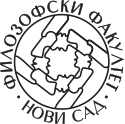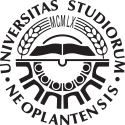15SRD17 - Social Security Systems
| Course specification | ||||
|---|---|---|---|---|
| Course title | Social Security Systems | |||
| Acronym | 15SRD17 | |||
| Study programme | Social Work | |||
| Module | ||||
| Type of study | first degree undergraduate academic studies | |||
| Lecturer (for classes) | ||||
| Lecturer/Associate (for practice) | ||||
| Lecturer/Associate (for OTC) | ||||
| ESPB | 6.0 | Status | ||
| Condition | none | Oblik uslovljenosti | ||
| The goal | The objective of the course is to familiarize students with theoretical knowledge about the structure, types, characteristics and goals of modern social security systems, the basic theoretical concepts in the field of social rights, characteristics of the international aspect of the development of social rights, and familiarization with the specifics and common characteristics of national social security systems in comparative perspectives. In addition, the objective of the course is to train students for the operationalization of the categorical apparatus in the field of the Social Security System, as well as training for the use of acquired knowledge in the process of (critical) analysis of the current state, thinking in solving the current problems and developing strategic directions in order to improve the work of institutions and social welfare and security services (ministries, pension and disability insurance services, health and employment services, social welfare services and the wider civil society sector ). | |||
| The outcome | Students should be able to: define basic concepts and concepts in the field of social security, define the goals of modern social security systems, define factors in the process of their development and change; to understand and recognize the specifics and characteristics in the development of different national social security systems; to apply acquired knowledge in different domains of professional activity; at the end of the course they will be able to analyze and integrate knowledge about basic concepts in the area of social security and social protection and to analyze the availability and quality of social protection services; to link different interpretations and theories about the principles of modern social protection systems and the importance of social rights in the social protection system; that they know how to evaluate the advantages and disadvantages of modern social security models, welfare state models, health, pension and disability insurance programs, as well as unemployment insurance and family, children and marginalized groups. | |||
| Contents | ||||
| Contents of lectures | Students will be introduced to basic concepts in the area of social security, social protection and social rights. A special part of the course will be devoted to the characteristics, types and goals of modern (European) social protection systems, as well as analysis of the international aspect of the development of social rights, welfare state models and characteristics of the welfare state. Within the course, in the national and international context, topics on the characteristics, development and issues of the health insurance, pension and disability insurance programs, as well as unemployment insurance will be addressed, with special emphasis on active employment policy measures. The course will also cover topics in the field of social protection of the family, children, marginalized groups, institutional care for the elderly, as well as the types and characteristics of the assistance and support programs. | |||
| Contents of exercises | Examples from practice related to basic concepts that will be addressed in theoretical teaching. | |||
| Literature | ||||
| ||||
| Number of hours per week during the semester/trimester/year | ||||
| Lectures | Exercises | OTC | Study and Research | Other classes |
| 2 | 2 | |||
| Methods of teaching | Lectures, interactive classes, group discussion. | |||
| Knowledge score (maximum points 100) | ||||
| Pre obligations | Points | Final exam | Points | |
| Activites during lectures | 10 | Test paper | ||
| Practical lessons | Oral examination | 40 | ||
| Projects | ||||
| Colloquia | 30 | |||
| Seminars | 20 | |||

